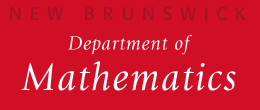MESSAGE FROM THE DEPARTMENT CHAIR (Roe Goodman)
A great deal has happened in this large and active department since Richard Falk became Acting Executive Dean of the Faculty of Arts and Sciences in June, 2000 and I replaced him as acting Department Chair. This newsletter describes some of the honors and awards to our faculty, the new faculty this year, faculty promotions, the faculty who will join us in September 2001, the retirements this year, and the lecturers and topics of our memorial lecture series. There is also news about the graduate and undergraduate programs.
The department hosted a large number of seminars and colloquia and many distinguished visitors this year. In October Maxim Kontsevich gave a series of four lectures on "Non-Archimedian Geometry and Mirrors". In February there was a Conference on "Model Theory and Descriptive Set Theory" organized by Gregory Cherlin, Simon Thomas, and Saharon Shelah. This conference was made possible by a generous gift from alumnus Mark Gordon and additional support from MAMLS.
The status of our department as one of the top mathematical research departments in the USA is underscored by the level of research grant support. For the fiscal year 2001 faculty members obtained more than two million dollars in new grant awards. Overall, the current grant level in the department is over seven and a half million dollars.
One of my goals as chair this year was to enlist a larger number of faculty to help with administrative work in the department. I want to thank my colleagues for their cooperation in helping me to achieve this. In particular, I want to thank Sagun Chanillo (and his collaborator Gregory Cherlin) for taking the job of Director for New Faculty Appointments, Jim Lepowsky (and collaborator Xiaochun Rong) for taking on the new job of Director of Professional Development of Graduate Students, and Mike Saks (and collaborator Vladimir Retakh) for taking on the new job of Director of the Undergraduate Major Program. I also want to thank Dan Ocone for taking on the enormous job of Vice-Chair for the Undergraduate Program, and Stephen Greenfield for coming back as Vice-Chair for the Graduate Program (starting in January, 2001), following Peter Landweber's term in this vital position.
A broad spectrum of information about the Department, both
current and from past years, is available on the Mathematics Department web
site. In particular, honors awarded to faculty in previous years
may be found on the
faculty honors page and honors received by undergraduate and
graduate students may be found on the
Mathematics Department prizes and awards page.
Joel's remarkable abilities have led to great success as a teacher on
the graduate level: his work as a classroom instructor, as a mentor of
graduate students and postdocs, and as the creator of a remarkable
worldwide intellectual community in mathematical physics and
statistical mechanics directly benefits all students and scholars in
these fields at Rutgers. Joel has had 33 successful doctoral students
and a large number of postdoctoral associates. His nomination for this
award was supported by e-mail from many individuals who wrote of his
enthusiastic and effective personal interest in their careers.
Joel runs a weekly mathematical physics seminar which meets twice on
Thursdays. Presentations at the seminar are rarely straightforward
lectures. There's a great deal of interaction and a remarkably relaxed
learning atmosphere. He also organizes statistical mechanics meetings
twice a year, bringing hundreds of students and researchers to
Rutgers. Each meeting features 30 to 40 presentations and various
panels. Papers are exchanged, jobs are negotiated -- the meetings are
wonderful scholarly occasions and invaluable opportunities for his
students and coworkers. Joel Lebowitz has been for years one of the
great educators of the Rutgers mathematics and physics communities.
In his 700-plus papers and several books Professor Shelah has had an
unparalleled influence on modern set theory and model theory. His
solutions to deep and longstanding problems and his independence techniques
forever changed the landscape of set theory; this is even more true in
model theory where his concepts and methods have completely revolutionized
the area. He also solved a number of famous problems arising in other
branches of mathematics, such as algebra, combinatorics, and topology.
This prize is given annually for research in, or other contributions
to, the broadly defined areas of differential equations and control
theory. The 2001 Reid Prize selection committee members were John
A. Burns (chair), Ruth F. Curtain, James G. Glimm, John Guckenheimer,
and Arthur J. Krener. They cited Professor Sontag's deep and
important scientific contributions to nonlinear control theory.
We congratulate these colleagues for their outstanding achievements
that led to these promotions.
Top
Tilla, who obtained her Ph.D. from New York University in 1959, came
to Rutgers as the chair of the Douglass College Mathematics Department
in 1970 after being on the faculties of UCLA, MIT, and Boston
College. She served as Douglass College math chair from 1970 to 1973,
and again from 1978 to 1980. She held a National Science Foundation
Visiting Professorship for Women in Science in 1983/84, and had
visiting positions at the Courant Institute of NYU, University of
California at Berkeley, MSRI at Berkeley, University of Maryland, and
City University of New York.
Her mathematical research commenced under the guidance of Lipman
Bers, and concerned Riemann surfaces and quasi-conformal maps. In
recent years she turned her attention to Lorentz surfaces, publishing
a monograph on this area in 1996 and supervising four Ph.D. theses
between 1995 and 1998. Since she was also Director of the Mathematics
Graduate Program in 1996/97, this was a remarkable achievement.
During her three decades at Rutgers, Tilla served on many department
committees (including graduate admissions and new faculty search),
university committees (for the faculty council, graduate school,
Douglass College, and other units), and professional groups such as
the Association for Women Mathematicians executive committee. All who
worked with her appreciated her calm, clear-headed analysis of the
issues and her personal touch. We shall miss her in the department.
Top
NSF staffers have repeatedly stated that "The core of VIGRE activity
is graduate education". Our most significant change in graduate
education has been the introduction of rotations,
which are individual tutorials given to VIGRE-supported students
during their first two years of graduate study. The rotations have
been guided by 36 different faculty members, including two from
Computer Science and one from Operations Research. The rotations have
included pedagogical activity (participating in the creation of new or
significantly modified courses) as well as more usual scholarly
work. The efforts of VIGRE students in just their first years of
graduate study have resulted in their co-authoring papers in three
different areas of mathematics. Stephen Greenfield
organized the VIGRE rotations during the past two years. In the coming
academic year, Simon
Thomas will take over as VIGRE Rotation Coordinator.
The VIGRE Seminar organized by Amy Cohen had an active and diverse
year. The seminar served as a venue for presenting summaries of
rotation activities. It additionally featured discussions about
mathematics education and mathematics outside of math
departments. Probably the best-attended seminar was a panel of chairs
or former chairs of Math Departments at Columbia, Montclair State, and
Swarthmore. They described what they expected of junior faculty and
how their hiring processes worked. Other notable meetings included a
discussion led by an NSF program officer (Joe Brennan) on how to
identify and obtain NSF grant support, and a panel of journal editors
who discussed how math papers get published. Several meetings were
devoted to educational issues: Roger Howe of the Yale Mathematics
Department presented information about TIMSS, a comparative study of
pre-college mathematics achievement in various countries; Gilbert Strang of MIT
discussed teaching linear algebra with an audience ranging from
faculty members to undergraduates taking basic linear algebra; Gerald
Goldin analyzed the evolution of ideas in mathematics education;
Amy Stern talked
about teaching mathematics in a middle school in Plainfield, New
Jersey.
The VIGRE REU
("Research Experience for Undergraduates") directed by János
Komlós continues this summer. Its activities are combined with
efforts of DIMACS and DIMATIA. A total of 23 undergraduates are
expected to participate this summer. Many of the students will work in
groups guided by the combined efforts of faculty members and VIGRE
postdocs and graduate students. Kia Dalili, a
mathematics graduate student, will assist Professor Komlós in
running the REU this summer.
Top
Special Mathematics Department Chair Teaching Awards were given to
Bernardo Ábrego, Sylvia Fernández, Clifford Smyth, and
Amy
Stern. Mr. Smyth also won a Dean's Award for Excellence in
Research from the Graduate School. He has worked on combinatorial
probability with applications to computational complexity and on
problems in geometry. Ms. Stern received an FAS Award for
Distinguished Contributions to Undergraduate Education, commemorating
her varied and successful teaching here. This year she
was a Graduate Fellow in the Science and
Mathematics Educational Partnerships program, and taught in the
Hubbard Middle School in Plainfield one day a week. She introduced her
middle school students to new topics in discrete mathematics outside
the standard curriculum. In the coming year, Klay Kruczek will
hold a similar fellowship. Louis Dupaigne was
awarded a Bevier Fellowship by the Graduate School to support his work
next year. Mr. Dupaigne had a French government award for his support
during the spring while working under the supervision of Haim Brezis.
Researchers from several NJ industrial labs, including Lucent, AT&T, NEC, RW
Johnson Pharmaceuticals, Telecordia, Mitre, Merck, and others, as well as from
national labs such as Sandia, NIST, and Los Alamos, expressed great interest
in considering our graduate students as interns, and offered descriptions of
specific projects and basic prerequisites.
We invite readers of this newsletter who may be willing to host
interns at their institutions or who have information leading to
possible internship opportunities to contact Eduardo Sontag (sontag@math.rutgers.edu), our internship coordinator.
If possible, responses should be sent by email to: alumni@math.rutgers.edu
PRIZES AND HONORS TO OUR FACULTY
JOEL LEBOWITZ
RECEIVES GRADUATE TEACHING AWARD
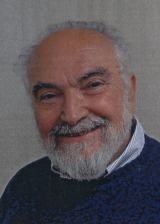
Dr. Joel Lebowitz, the George William Hill Professor of Mathematics
and Physics, received the Graduate Teaching Award by the Rutgers
Graduate School-New Brunswick on April 25, 2001. Although Joel's
scholarly excellence and humanitarian qualities have been recognized
previously by Rutgers (see the Spring
2000 Newsletter),
this award specifically honors his achievement
as an instructor and mentor on the graduate and postdoctoral level.
SAHARON SHELAH AWARDED WOLF PRIZE AND BOLYAI PRIZE
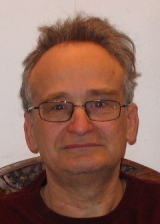
Professor Saharon Shelah, of Hebrew University of Jerusalem and
Rutgers University, won the 2001 Wolf Foundation Prize (jointly with
V.I. Arnold) for his many fundamental contributions to mathematical
logic and set theory, and their applications within other parts of
mathematics. Professor Shelah also won the János Bolyai
International Mathematical Prize of the Hungarian Academy of Sciences,
which consists of a medal and an award of $25,000. The award was
presented on November 4, 2000 in a ceremony in Budapest, Hungary.
This award was established in 1903 by the Hungarian Academy of
Sciences in honor of János Bolyai, co-discoverer of
non-Euclidean geometry, and was presented to H. Poincaré in
1905 and to D. Hilbert in 1910, after which various historical events,
beginning with the first World War, forced its interruption. The
Academy has decided to renew the award, and Professor Shelah is the
first recipient in modern times. In keeping with the original plan,
the prize will be awarded every five years to the author of the best
mathematical monograph containing original research which has been
published in the previous ten years.
EDUARDO SONTAG
WINS REID PRIZE FROM SIAM
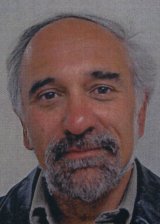
Professor Eduardo Sontag has been named the winner of the 2001
W.T. and Idalia Reid Prize in Applied Mathematics, awarded by the
Society for Industrial and Applied Mathematics. The prize consists of
$10,000 and an engraved medal. These will be presented at the SIAM
Annual Meeting in San Diego, July 9-13, 2001, where Professor Sontag
will also give a plenary address.
More Faculty Honors
Top
NEW FACULTY THIS YEAR
Associate Professors
A. Shadi
Tahvildar-Zadeh, who specializes in nonlinear wave
propagation with applications to general relativity and fluid
dynamics, joined the department as a tenured Associate Professor. He
received a B.S. from Sharif University of Technology in Tehran, Iran
(1985), and a Ph.D. from the Courant Institute, New York University
(1991). After a year at the Institute for Advanced Study and two
years at the University of Michigan, he was an Assistant Professor at
Princeton University for six years. He won a Sloan Foundation
Fellowship in 1997.
Assistant Professors
Ivan Blank,
who received a B.A. from Princeton (1993) and a
Ph.D. from the Courant Institute, New York University (2000), with the
last part of his graduate work carried out at the University of Texas,
Austin, joined the department as a Hill Assistant Professor. He studies the
geometric properties of so-called free boundaries, such as the
ice-water boundary created when water is freezing. He won a "Liftoff"
fellowship from the Clay Mathematics Institute to support his research
during the summer of 2000.
Yves Capdeboscq,
who received a graduate engineering degree from the École Centrale,
Paris (1995), a Diploma in Advanced Study in Mathematics from
Cambridge University (1995), and a Ph.D. in Applied Mathematics at the
University of Paris VI (1999), joined the department as a Hill
Assistant Professor. He studies diffusion equations with applications
to numerical computations in nuclear reactors. He was a postdoctoral
fellow at Rutgers and at the Mathematical Sciences Research Institute
in Berkeley during the 1999-2000 academic year.
W. Ethan
Duckworth,
who received a B.A. from Rice University (1993), and
Ph.D. from the University of Oregon (2000), joined the department as a
Hill Assistant Professor. He studies algebraic transformation groups,
finite simple groups and geometry.
Matthew
Leingang, who received a B.A. from the University of Chicago (1995),
and a Ph.D. from Harvard University (2000), joined the department as a
VIGRE Assistant Professor. He studies symplectic geometry, moment
maps, and symmetry groups, with applications to the topological
aspects of quantum physics.
Amelia
Taylor,
who received a B.S. from St. Olaf College (1994), an
M.S. from Purdue University (1997) and a Ph.D. from the University of
Kansas (2000), joined the department as a VIGRE Assistant
Professor. Her research specialty is commutative algebra, symbolic
computational methods, and Groebner basis theory. She won a "Liftoff"
fellowship from the Clay Mathematics Institute to support her research
during the summer of 2000.
Machiel Van
Frankenhuysen, who received a master's degree in mathematics
(1990) and a Ph.D. (1995) from the Catholic University of Nijmegen,
joined the department as Assistant Professor. His current research
relates fractal geometry and number theory. He held a Marie-Curie
fellowship at the Institut des Hautes Études Scientifiques
(1996-1998), and was a visiting assistant professor at University of
California, Riverside (1998-2000).
Top
FACULTY PROMOTIONS
Michael Saks was promoted to the rank of Professor
II
Stephen Greenfield
was promoted to the rank of Professor I.
Michael Kiessling
was promoted to the rank of Associate Professor with tenure.
NEW FACULTY FOR FALL 2001
Professors
Doron Zeilberger will join the department as a Board of Governor's
Professor of Mathematics, coming to Rutgers from Temple University.
A winner of the AMS Steele Prize in 1998, he is renowned for his
research in algebraic and enumerative combinatorics and also his
explorations in "experimental mathematics" (with his "coauthor"
Salosh B. Ekhad, who is a computer).
Associate Professors
Paul Feehan will join the department as a tenured Associate
Professor, coming to Rutgers from Ohio State University and the
University of Dublin, Ireland. His research is in partial
differential equations, especially gauge theories and applications to
the topology of four-manifolds.
Assistant Professors
Lisa Carbone will join the department as a tenure-track Assistant
Professor, coming to Rutgers from Harvard University where she
has been a Benjamin Pierce Assistant Professor since 1997. Her
specialties are group actions on trees, tree lattices, and Kac-Moody
groups.
Stephen Miller will join the department as a tenure-track Assistant
Professor, coming to Rutgers from Yale University where he has
been an Assistant Professor since 1997. His specialties are number
theory, automorphic forms, and L-functions
Shawn Robinson will join the department as a VIGRE Assistant
Professor, coming to Rutgers from the University of North Carolina
at Chapel Hill where he just finished his Ph.D. thesis in algebraic
geometry (cohomology and K-theory of flag varieties) under
Shrawan Kumar.
Inna Korchagina will join the department as an Assistant Professor,
coming to Rutgers from Ohio State University, having recently
completed her Ph.D. research on finite simple groups under the direction
of Ron Solomon.
Instructors
Yavor Markov will join the department as an Instructor/Instructional
Technology Specialist and will be involved with the department's
Instructional Technology Initiative (see WeBWorK). He just completed his
Ph.D. at the University of North Carolina, Chapel Hill, with a
dissertation in Representation Theory of Lie Algebras and Quantum
Groups directed by Alexander Varchenko.
Top
TILLA WEINSTEIN RETIRES
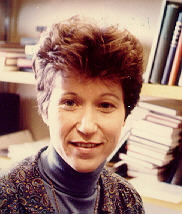 Tilla Weinstein retired as of January 1, 2001. A
retirement party was held for her on May 1, 2001, and she will be
moving soon to Reno, Nevada to be nearer to family.
Tilla Weinstein retired as of January 1, 2001. A
retirement party was held for her on May 1, 2001, and she will be
moving soon to Reno, Nevada to be nearer to family.
THE NSF VIGRE GRANT
The Mathematics Department is in the second year of a five year grant
worth two and one-half million dollars through the National
Science Foundation's VIGRE (Vertical InteGration of Research and
Education) program. The Rutgers project,
"Extending
and Renewing the Education of Mathematicians",
is changing the way that postdoctoral fellows and graduate students
interact with faculty, undergraduates, and each other.
LEWIS AND D'ATRI MEMORIAL LECTURES
The Department's two distinguished lecture series,
offered in memory of two of our colleagues, were presented this
Spring. The
Lewis lectures, on the general theme of quantum field theory and
topology, were given by Graeme Segal of Oxford University. His three
lectures were devoted to the mathematical structure of quantum field
theory, quantum field theory and K-theory, and quantum theory and
representation theory. The D'Atri
lectures, given by Brian White of Stanford
University, were devoted to the geometry of soap films and equations
of evolution for curves and surfaces.
Top
NEWS FROM THE
UNDERGRADUATE PROGRAM
(Dan Ocone,
Undergraduate Vice-Chair)
About 9,600 undergraduates took courses in the Math
Department in Fall 2000, and about 7,600 undergraduates in Spring
2001. Handling the administration of this massive enrollment would
not have been possible without the splendid assistance of Deputy
Vice-Chair for Undergraduate Affairs Enriqueta R. Carrington and the
constant support of Bill Irvine and staff members Diane Apadula, Carla
Ortiz, and Joanna Hess.
Encouraging the early development of the talent of our undergraduates
is an important activity of the Department. We have two programs
devoted to such development in place: the REU ("Research Experience for
Undergraduates") for development of research ability, and the
Recitation Mentor Program for development of teaching ability.
The
DIMACS/VIGRE REU is discussed elsewhere in this
newsletter.
The Department currently employs sixty undergraduates, not necessarily
majors in math, as peer mentors in calculus workshops. About a half
dozen of these, seniors with very high grades and strong performances
as peer mentors in previous semesters, work as Recitation Mentors,
teaching their own recitation section of precalculus. These young
teachers are gaining very valuable experience and it has been
gratifying to see the increase in the number of academically strong
students who are going into secondary school teaching. Details about
the Peer Mentor program can be found on the Peer Mentor homepage.
For information on Recitation Mentors, go to
Jobs
for Undergraduates from the department home page. It is a pleasure
to thank Jerry Tunnell
for his work as Peer Mentor Coordinator.
The department awards several undergraduate
prizes each year. This year's winners were as follows: the David
Martin Weiss Award for achievement in mathematics by a first-year
student was won by Douglas Scheinberg; Jared Smollik won the Lawrence
Corwin Prize for best performance on the prize exam by a sophomore;
the Bogart Prize for general achievement as a math major went to
See-Loon Ng. Daniel Wilckens won the Bradley Memorial Prize for best
overall performance on the prize exam; he also received an honorable
mention in the annual William Lowell Putnam Mathematics Exam, placing
in the top 50 out of the 3000 undergraduate students in the United
States and Canada who took the exam this year.
The Mathematics Department continues to refine and
modernize its course offerings. The version of Math 250, Introduction
to Linear Algebra, incorporating the use of computing with MATLAB,
continues to be offered in 3 sections per semester. Thanks especially
to Roe Goodman and
VIGRE graduate student Michael Weingart for developing the original
MATLAB experiments. More details may be found on the Math 250 web
page.
Top
Amy Cohen, Steve Greenfield, and Jean Taylor obtained
funding from the Rutgers Instructional Technology Initiative to begin
web support for Math 135, our largest single course (total annual
enrollment: approximately 3,000 students). A package called WeBWorK,
developed at the University of Rochester, was chosen as the basis for
our efforts. WeBWorK is open-source and free. Difficulties occurred
due to differences in computer environments and to scaling (the
largest course using WeBWorK at Rochester involved 100
students!). Jean Taylor (coordinator of Math 135), David Galvin (the
"head TA" for 135 this year), Risa Hynes (the Math Department's
computer systems administrator), and David Roberts (part-time computer
specialist) worked hard to make this effort successful. WeBWorK
should be available next year on a routine, continuing basis to Math
135 students, with assistance from Yavor Markov, a new
Instructor/Instructional Technology Specialist joining the
department. We expect it will be a useful addition to the course.
New courses have been developed this year to replace
our old modeling course, Math 338, and to reinvigorate the Biomath
Major. Now, instead of Math 338, we shall have a Math 336,
Differential Equations in Biology, a new Math 338, Discrete and
Probabilistic Models in Biology, and a Math 339, Mathematical Methods
in Social Sciences
(more details). We plan to offer a section of 336 in Fall 2001,
as well as one section of 336 and one of 338 in Spring 2002. Eduardo Sontag has
played a major role in this development (see the links he has
set up to the very active field of
Mathematical Biology).
The
honors section of Math 103, Topics in Mathematics for the Liberal
Arts, organized around the theme of cryptography, has become an
established honors offering for non-majors. Steve Greenfield designed
it originally with grant support from the NSF, and he left it in shape
to be taken up by other faculty. This year VIGRE postdoc Jon Hanke ran the course
and reports success.
Continuing on the currently hot topic of
cryptography, we thank Professor Shirlei Serconek (Math Ph.D.,
Rutgers, 1980), visiting from the Institute of Mathematics and
Statistics of the Federal University of Goiás (IME-UFG) in
Brazil, for developing and teaching Math 395-Mathematics of
Cryptography this spring. Courses like this give our undergraduates
the opportunity to see the abstractions they worked so hard to
understand in their Number Theory and Linear Algebra courses applied
to exciting technological issues.
After a spirited debate, the department voted in a prerequisite change
to prepare our students for the upper level courses with theoretical
content. Namely, the department decided to add the prerequisite
"Math 300 or permission of the department" to the courses Math 311,
350, 361, 435, 441, and 461. Math 300, of course, is "Introduction to
Math Reasoning". The idea is to insure that students have a
competence level in reasoning sufficient to make headway in the upper
level courses. At least that is what we hope!
NEWS FROM THE GRADUATE
PROGRAM
(Stephen Greenfield,
Graduate Director)
Ten students earned Ph.D.'s this year. They are (with advisors
parenthesized):
Bernardo Ábrego
(József Beck)
Sylvia
Fernández
(József Beck)
Maurice Hasson
(Richard
Gundy)
Brian Ingalls
(Eduardo Sontag)
Antun Milas
(James Lepowsky)
Clifford Smyth
(Michael Saks)
Darko Volkov
(Michael Vogelius)
Steven Warner
(Simon Thomas)
Lei Zhang
(YanYan Li)
Yi Zhao (Endre Szemerédi)
Maurice M. Weill and Adrienne R. Weill have given a generous endowment
to the Rutgers Department of Mathematics. Income from their gift has
begun to be received and will be used this summer to support the
scholarly travel plans of Juan Davila, Carlo Mazza,
and Yuka Umemoto Taylor. We will use these funds to further support
graduate student activities next year.
Meijun Zhu received his Ph.D. from Rutgers University in 1996 under
the direction of Yanyan Li. He is now a faculty member at the
University of Oklahoma, and was recently designated as one of four
winners of the AMS Centennial Fellowships for 2001-2002.
We currently anticipate 14 new graduate students arriving in the
fall. But enrollment nationally in graduate programs in the
mathematical sciences has declined more than 20% over the last
decade. Competition for the best graduate students is intense. Please
tell appropriate students about our program and suggest that they
apply. Also, please tell us about these
students so we can approach them. With resources from VIGRE and the
Graduate School, we are able to offer competitive stipends to support
graduate students in a program of high quality with low attrition.
The Department has an ongoing Summer Internship program for our
graduate students. The objectives are (a) to expose them to industry
and government career alternatives, and (b) to familiarize those
students opting for traditional academic careers with "real life"
applications of mathematics.
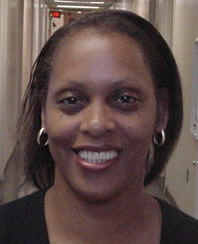
The Graduate Program has a new administrative assistant, Ms. Brenda
E. Skinner (bskinner@math.rutgers.edu). This
job was previously held for several years by Bil Gonzalez, who has
moved on to another position at the university. Ms. Skinner has now
been through the spring semester, and has gotten acquainted with the
unusual and wonderful people who apply to the graduate
program. Ms. Skinner worked previously for Novartis, where she was a
customer service representative and managed wholesale accounts. She
handles the Graduate Program's e-mail, telephone contacts, and
correspondence, and is learning answers to more questions about the
program every day. She helps everyone connected with the program.
Further news relevant to the Graduate Program is
reported in the section about VIGRE.
Top
PIZZA SEMINAR NEWS
(Aaron Lauve,
Curator)
The Pizza Seminar is a weekly talk given by a
graduate student to an audience of graduate students. The
talks are informal and give students the opportunity to practice
the important art of communicating mathematical ideas before a
nonjudgemental audience.
A wide variety of topics are covered. Last
semester, three of the speakers introduced us to their research and
outlined their recent results; five more provided overviews of
the basic ideas in their areas of interest, while the remaining
three speakers chose to present items of recreational interest
that would not normally be seen in classes.
The weekly seminar is occasionally replaced by a
Faculty Research Glimpse: a meeting during which three or four
faculty members speak about their current research interests.
The Faculty Research Glimpses provide graduate students with an
opportunity to hear first-hand what problems are currently being
thought about here at Rutgers. Four of these "Faculty Research
Glimpses" were given this year: two in the Fall, and two in the
Spring. For more information go to
Pizza Seminar.
Top
ALUMNI NEWS
The Mathematics Department is very interested in hearing from
its alumni/alumnae from either the undergraduate or graduate program, about
where they are and what they are doing. One aim is to set up a
Department website that would facilitate contacts among former graduates and
serve as a source of contacts for our current graduates. We would be
especially interested to know if you are employed in a company that hires
mathematics graduates at any level, since we are seeking summer internship
opportunities for our students and also occasionally look for individuals
willing to come to campus to speak about job opportunities in industry for
mathematics majors. Please let us know if you would be willing to
participate in such activities.
Name:
Current Address:
Job Title and Company:
Home Phone:
Business Phone:
Email address:
Web page url:
News item: If you do not have access to email, please FAX the
information to 732-445-5530 (attention: Alumni Committee) or
mail the information to:
Alumni Committee
Top
Department of Mathematics - Hill Center
Rutgers, The State University Of New Jersey
110 Frelinghuysen Rd
Piscataway, NJ 08854-8019
Maintained by
goodman@math.rutgers.edu
and last modified 6/07/2001.

